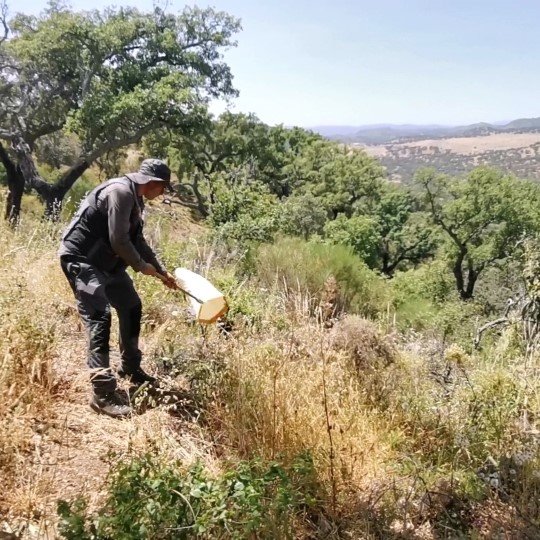Discovering Iberian spiders: a scientific journey through the cork forests of the peninsula
The SpyderSysEvo research group, led by Dr. Miquel Arnedo, has recently returned from a one-month sampling campaign for the research project "SPIDCHANGE: Spiders as integrators of brown and green food webs in a changing world". In this campaign, the group has visited multiple locations in the northern half of the peninsula, including Catalonia, Valencia, Asturias, Galicia and the Basque Country. They have also explored southern regions such as Andalusia, with stops in Cádiz, Huelva and Seville, as well as Extremadura. These areas were selected for their environmental diversity and the significant presence of cork trees, characteristic forests of the Western Mediterranean.
This project seeks to understand how spider communities are distributed and interact in the various cork ecosystems of the Iberian Peninsula. "The project is crucial to understand how spider communities respond to climate change and human activity, since these species are key indicators of the health of Mediterranean ecosystems" explains Dr. Arnedo, director of the Research Institute of Biodiversity of the University of Barcelona.
"The project studies the effect of environmental changes on spider communities, especially in plots with different degrees of coverage, fragmentation and latitude."
One aim of the project is to assess the impact of climate change on spider populations. Although direct effects have not been clearly observed, latitudinal gradients and fragmentation are expected to provide important clues. These comparative studies will help to understand how variations in temperature and humidity, as well as forest utilization, can influence the biodiversity and behavior of spiders, and how changes in these communities can affect other relevant arthropods in ecosystems, such as phytophages and decomposers.
Field work, challenges and overcoming
The field team is composed of five key members: two PhD students, Morena Nava and Manuel Marquerie, an Erasmus student, Andrea Baldissari, a postdoctoral researcher, Marc Domènech Andreu and a collaborator from the Forest Technology Center of Solsona, the Mar Pallarés.
During sampling, the team uses a combination of methods such as pitfall traps, bushwhacking with special hoses, and direct captures, both day and night, to ensure a complete representation of the spider and insect communities at different heights and microhabitats of the forests.
Finally, the predoctoral researcher highlights the logistical and technical learning, such as the importance of preparing materials and the use of specific sampling techniques for different habitats: "I never thought that logistics would be so crucial. Prepare all the material and making sure nothing is missing is essential to fieldwork." These experiences are essential for the training of doctoral students.
Futures of the project and the group
The research group will classify the collected individuals using molecular techniques such as metabarcoding to speed up the process. In addition, he is exploring new lines of research to incorporate more arthropod groups into state of nature monitoring protocols, as they provide information at finer geographic and temporal scales than, for example, vertebrates.
This project will help to better understand spiders and their habitats and will provide crucial information for the conservation of Mediterranean ecosystems in the face of the challenges of climate change.
